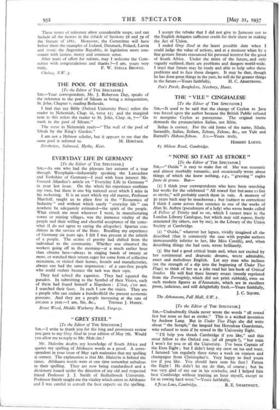EVERYDAY LIFE IN GERMANY
[To the Editor of THE SPECTATOR.] SIR,—AS one who had the pleasure last autumn of a tour through Westphalia—industrially speaking the Lancashire and Yorkshire of Germany—I read with keen interest Mr. Everard Allardice's article on " Everyday Life in Germany " in your last issue. On the whole his experience confirms my own, but there is one big national asset which I miss in his reckoning. It is an asset which my old master, Professor Marshall, taught us to place first in the " Economics of Industry " and without which surely " everyday life " can nowhere be adequately estimated—the spirit of the people. What struck me most wherever I went, in manufacturing towns or mining villages, was the immense vitality of the people and their willing and cheerful acceptance of the some- what (I do not agree to saying the altogether) Spartan con- ditions in the service of the State. Recalling my experience of Germany six years ago, I felt I was present at the rebirth of a people. The centre of gravity had shifted from the individual to the community. Whether one observed the workers going off in the morning—at a much earlier hour than obtains here—always in singing bands of twenty or more, or watched their return eager for some form of collective recreation, or visited their homes, hostels and manufactories, always one had the same impression : of a care-free people who could endure because the task was their own.
They had solved the equation. They had squared the paradox. In submitting to the Symbol of their Vision, each of them had found himself a Napoleon : Pace, c'est moi.
I searched their faces. In each I saw the vision. They are a people who can endure a hundredfold the present economic pressure. And they are a people increasing at the rate of 200,000 a year.—I am, Sir, &c., THOMAS J. HARDY.
Benet Wood, Middle Warberry Road, Torquay.














































 Previous page
Previous page